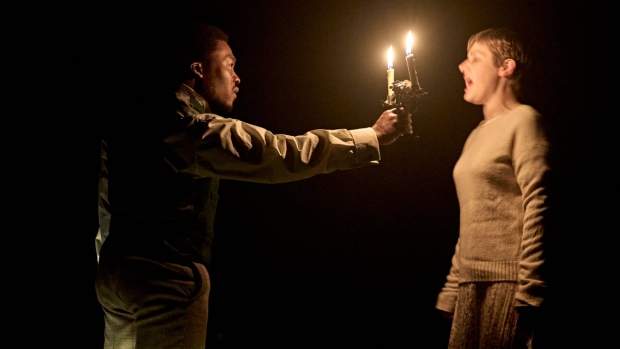The Glow at Royal Court Theatre – review

© Manuel Harlan
Alistair McDowall is not a man to give audiences an easy time. His previous plays have asked them to believe in a sinister cult and strange goings-on in a base on Pluto. His new work, The Glow, begins in the shady world of Victorian spiritualism and ends in outer space, with quite a lot of time travel in between.
It's like watching an episode of Doctor Who crossed with J.B Priestley with a smattering of Caryl Churchill thrown in. If you surrender to it, it's utterly exhilarating and absorbing. But you might also write it off as utterly bonkers.
I loved it from the moment Mrs Lyall (Rakie Ayola), a crazed spiritualist, walks into a dark cell and shines a light on a character known only as 'The Woman' (Ria Zmitrowicz) to recruit her as a medium in her crazed desire to tear down the veil between worlds. Once settled into Lyall's home, to the resentment of her son, Mason, (Fisayo Akinade), the Woman quickly reveals powers far greater than any Mrs Lyall has dreamt of.
She is haunted by visions of the past, full of violent horror. But she also seems to contain light, to be able to conjure energy from within herself. All this is beautifully conveyed in a series of flashing scenes on Merle Hensel's versatile slab-like set, with its hidden exits, and by Tai Rosner's videos and Jessica Hung Han Yun's lighting.
But it's in the longer second half that the play takes off, as it soars through time and space, leaving the Victorian starting point behind, as the Woman, now sometimes called Brooke, moves from pre-history to 1998, and back and beyond. In 1348, she is a captive of a man called Haster (Tadhg Murphy); in 1993, she meets a woman called Ellen (Ayola); in 1979, she encounters a young historian called Evan (Akinade) who is obsessed with the story of "The Woman in Time", a figure both angelic and demonic, who appears through history as a kind of "social thermometer" of the age.
It's dizzying but also always gripping. There's a story tugging you along, as well as a complex web of themes. McDowall seems to be creating his own myth in order to examine the nature of myth and folklore. He draws on a rich well of earlier imaginings from the story of the Fisher King (wounded in the thigh as Haster is, and healed as he is too), from Arthurian legend and from Christian imagery of suffering and redemption, of light and darkness.
In the process of this legend-making, he touches too on very human themes, of loneliness and the need for compassion and care. It's when she discovers love that Brooke begins to escape the suffering that marks her existence; there is something moving in the way that she breaks the time continuum to bring healing and resolution to those who have given her shelter and protection when she needed it.
It could all seem so fantastical that it becomes meaningless, but director Vicky Featherstone roots the play in a carefully sustained realism which the acting follows. The events are unbelievable, but the characters created by the cast are not. All are terrific but Zmitrowicz is sensational, finding a warmth, sadness and believability in a character who is literally symbolic.
Her final monologue, flying with a vision of a better future that offers hope for the planet and for humankind, really does glow with passion and possibility. The Glow is not an easy play but it's one that asks the most challenging questions in remarkably original ways.












